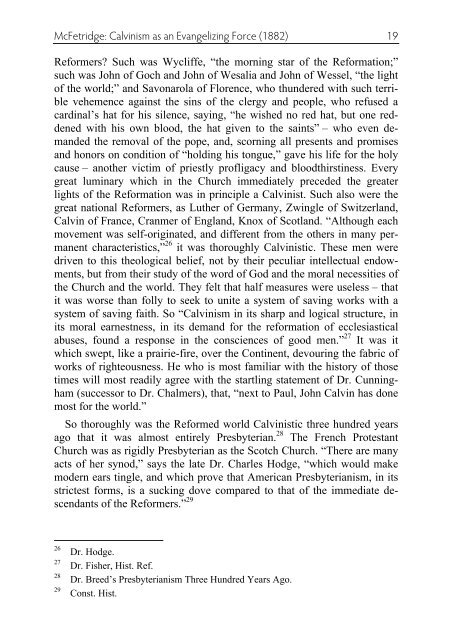Calvin and Missions - World Evangelical Alliance
Calvin and Missions - World Evangelical Alliance
Calvin and Missions - World Evangelical Alliance
Create successful ePaper yourself
Turn your PDF publications into a flip-book with our unique Google optimized e-Paper software.
McFetridge: <strong>Calvin</strong>ism as an Evangelizing Force (1882) 19<br />
Reformers? Such was Wycliffe, “the morning star of the Reformation;”<br />
such was John of Goch <strong>and</strong> John of Wesalia <strong>and</strong> John of Wessel, “the light<br />
of the world;” <strong>and</strong> Savonarola of Florence, who thundered with such terrible<br />
vehemence against the sins of the clergy <strong>and</strong> people, who refused a<br />
cardinal’s hat for his silence, saying, “he wished no red hat, but one reddened<br />
with his own blood, the hat given to the saints” – who even dem<strong>and</strong>ed<br />
the removal of the pope, <strong>and</strong>, scorning all presents <strong>and</strong> promises<br />
<strong>and</strong> honors on condition of “holding his tongue,” gave his life for the holy<br />
cause – another victim of priestly profligacy <strong>and</strong> bloodthirstiness. Every<br />
great luminary which in the Church immediately preceded the greater<br />
lights of the Reformation was in principle a <strong>Calvin</strong>ist. Such also were the<br />
great national Reformers, as Luther of Germany, Zwingle of Switzerl<strong>and</strong>,<br />
<strong>Calvin</strong> of France, Cranmer of Engl<strong>and</strong>, Knox of Scotl<strong>and</strong>. “Although each<br />
movement was self-originated, <strong>and</strong> different from the others in many permanent<br />
characteristics,” 26 it was thoroughly <strong>Calvin</strong>istic. These men were<br />
driven to this theological belief, not by their peculiar intellectual endowments,<br />
but from their study of the word of God <strong>and</strong> the moral necessities of<br />
the Church <strong>and</strong> the world. They felt that half measures were useless – that<br />
it was worse than folly to seek to unite a system of saving works with a<br />
system of saving faith. So “<strong>Calvin</strong>ism in its sharp <strong>and</strong> logical structure, in<br />
its moral earnestness, in its dem<strong>and</strong> for the reformation of ecclesiastical<br />
abuses, found a response in the consciences of good men.” 27 It was it<br />
which swept, like a prairie-fire, over the Continent, devouring the fabric of<br />
works of righteousness. He who is most familiar with the history of those<br />
times will most readily agree with the startling statement of Dr. Cunningham<br />
(successor to Dr. Chalmers), that, “next to Paul, John <strong>Calvin</strong> has done<br />
most for the world.”<br />
So thoroughly was the Reformed world <strong>Calvin</strong>istic three hundred years<br />
ago that it was almost entirely Presbyterian. 28 The French Protestant<br />
Church was as rigidly Presbyterian as the Scotch Church. “There are many<br />
acts of her synod,” says the late Dr. Charles Hodge, “which would make<br />
modern ears tingle, <strong>and</strong> which prove that American Presbyterianism, in its<br />
strictest forms, is a sucking dove compared to that of the immediate descendants<br />
of the Reformers.” 29<br />
26 Dr. Hodge.<br />
27 Dr. Fisher, Hist. Ref.<br />
28 Dr. Breed’s Presbyterianism Three Hundred Years Ago.<br />
29 Const. Hist.

















